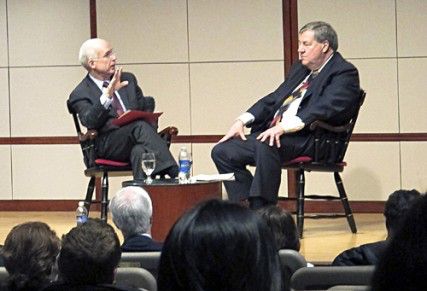
School of Management sophomore Albert Tawil said Dennis Swanson gave insight not only about the television industry, but also its present-day obstacles.
“He’s such a big name and he contributes [to programs] that we can all recognize like Monday Night Football and the Olympics,” Tawil said. “It seemed like it was something that would be worth my time and that he would be interesting to hear from.”
Tawil was among about 30 students went to the SMG Auditorium to listen to Swanson, the president of Stations Operations for FOX Television Stations Inc. Tuesday night, as part of the dean’s speaker series.
In his lecture “FOX TV: Leading the Media in Turbulent Times,” Swanson took students through his career and the history that shaped the current state of the broadcast industry. A focal point of Swanson’s lecture reviewed how television news must find a way to compete with new media technologies if it expects to survive.
“I point to this thing here,” said Swanson, referring to the iPhone in his hand. “This is our competitor.”
“How many people in this audience here watch television for news? A few,” he said as people raised their hands. “How many people get their news off of this and their information off of this? Yeah, more hands.”
Swanson said students interested in entering the field of broadcast news should remember it’s the hard times in life that matter.
“As you go through life, you’re going to have ups and downs folks, trust me,” he said. “The quality of your life will not be determined by the ups. Your quality of life will be determined by the downs and how you deal with them.”
SMG graduate student Atip Viyakornvilas said Swanson’s rise to major networks, as well as his advice, inspired him.
“It was interesting, especially how he progressed in his life like he started small and how he is where he is after moving around other networks like ABC to Fox,” Viyakornvilas said.
Other than advice, Swanson also talked about the problems recording devices such as TiVo and DVR cause in the market for television news, especially late-night news. The number-one time slot for DVR viewing is 10 p.m. to 11 p.m.
“So our competition at 10 [p.m.] is not the other stations doing news at 10 [p.m.], we beat them easily,” he said. “Our competition at 10 [p.m.] is mobile devices and DVRs.”
Despite the obstacles television news must overcome, Swanson said the business doesn’t look too bleak.
“I don’t want any of my comments to scare anybody about the future of media and broadcasting.” Swanson said. “It’s still a wonderful business, and if we’re smart and we don’t let ourselves sit around and become dinosaurs, we’ll be around for awhile.”
Tawil said he was impressed with hearing about Swanson’s inside knowledge of the industry.
“I thought it was really interesting to hear a personal perspective from such a high-ranking executive in these big companies,” Tawil said. “It was very interesting to hear about the contrast between the networks and how he helped with them.”


















































































































